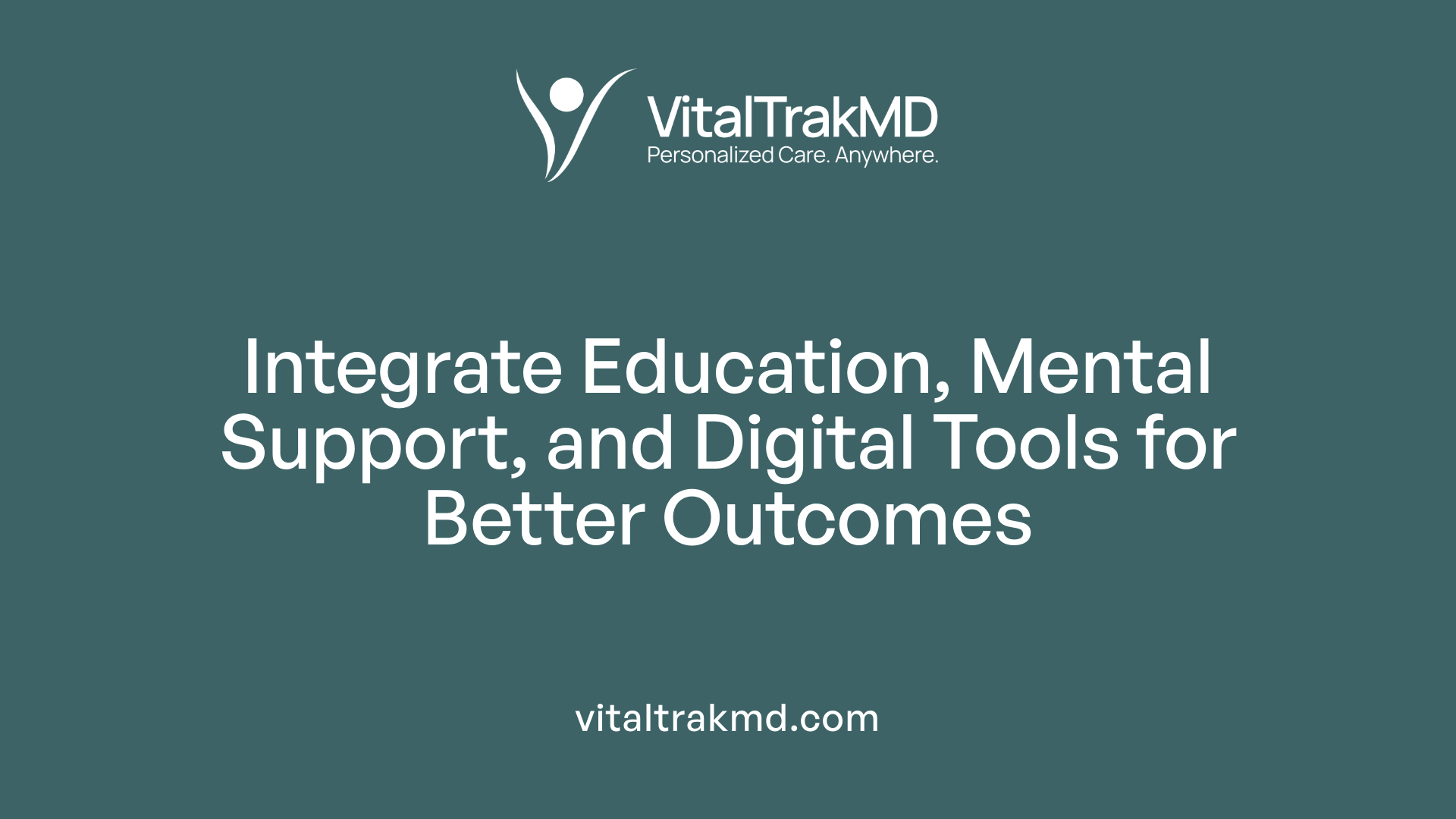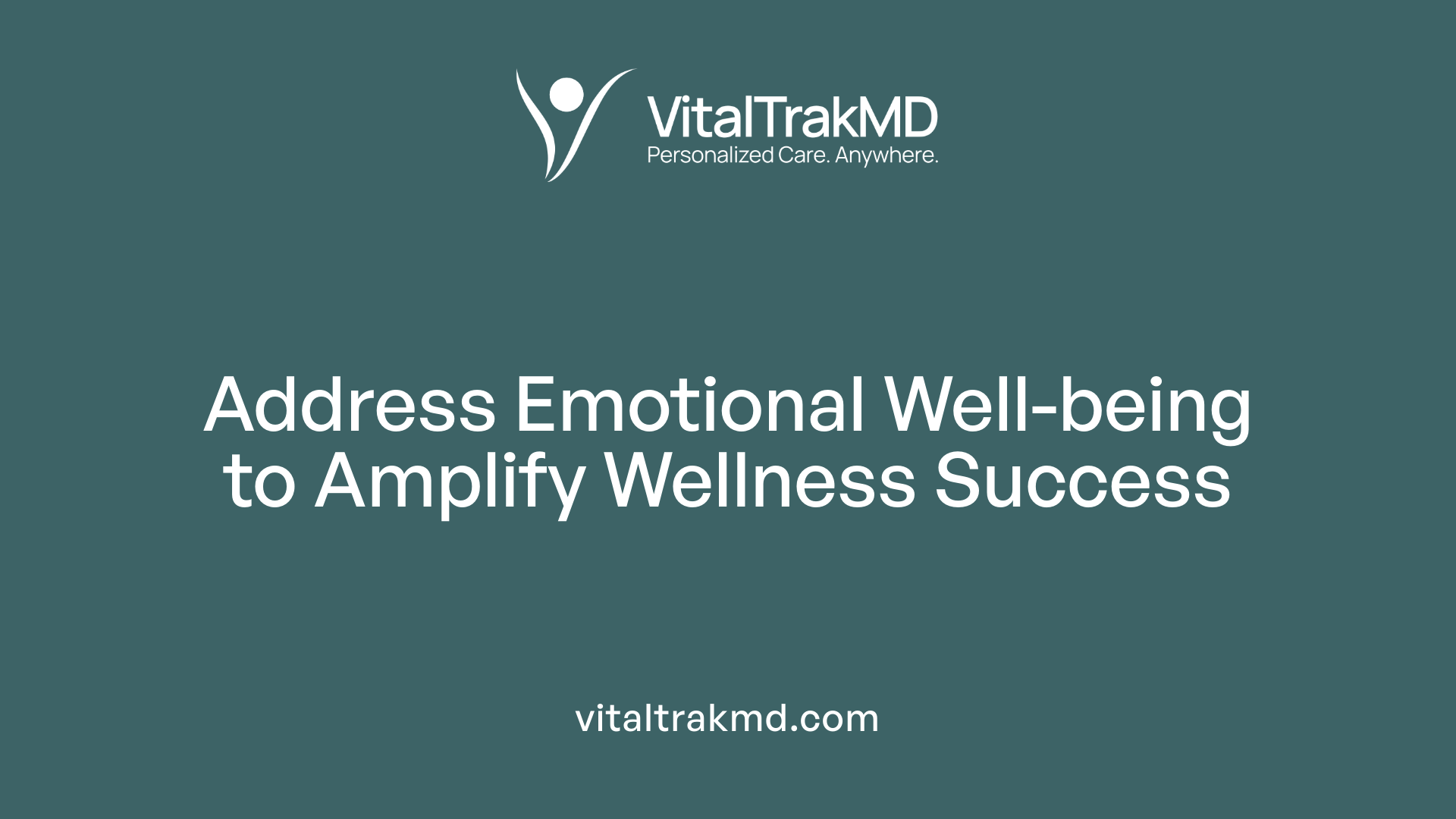How Hybrid Healthcare Helps Adults Stay Motivated With Daily Check-Ins

Embracing Hybrid Healthcare to Enhance Daily Motivation
As adults navigate the complexities of maintaining health and wellness, hybrid healthcare programs combining digital tools, medical expertise, and behavioral support are emerging as effective solutions. By integrating personalized daily check-ins with professional guidance, these programs help individuals stay motivated and committed to long-term health goals, particularly in weight management and chronic disease prevention.
Comprehensive Components of Effective Wellness Programs

What are the key components of effective wellness programs?
Effective wellness programs are designed to be comprehensive and multi-faceted, addressing a wide spectrum of health and wellness needs. They commonly include elements such as health education, nutritional counseling, regular health screenings, opportunities for physical activity, behavioral and mental health support, and stress management techniques. These programs often include ongoing progress monitoring and personalized strategies that account for an individual’s unique health profile and lifestyle.
Integrating medical expertise and counseling within these programs ensures that participants receive a holistic approach to wellness, which is shown to improve outcomes such as weight management, blood pressure control, and chronic disease prevention. Promoting sustainability over quick fixes encourages long-term behavior change rather than short-term results.
Use of digital tools
Modern wellness initiatives frequently leverage digital technology to enhance engagement and personalize care. Tools like mobile apps offer users the convenience of tracking progress, accessing health coaching, viewing educational content, and receiving reminders. Programs also utilize online assessments, such as personalized health risk tests, to guide tailored action plans.
Digital platforms provide various formats for coaching and support, including virtual sessions, group interactions, and text-based communications. These flexible delivery methods make wellness programs accessible and adaptable to different lifestyles and preferences.
Importance of mental health support
Recognizing the strong link between mental health and physical wellness, effective programs integrate behavioral counseling and mental health resources. This dual focus helps address emotional factors that influence health behaviors and conditions.
For example, coaching approaches that use motivational interviewing create supportive environments where individuals find internal motivation for change. Behavioral support is essential for managing stress, sleep quality, and mental well-being—key factors that impact overall health outcomes.
Engagement strategies
Successful wellness programs invest in participant engagement by forming wellness committees and establishing strong leadership support. Clear, ongoing communication about program benefits and participation opportunities is crucial.
Incentives such as rewards and recognition, as well as fostering a fun and social atmosphere, help increase involvement. Health coaching partnerships focusing on behavior change, motivation, and accountability have demonstrated improvements in clinical measures like blood pressure and cholesterol, illustrating the power of sustained engagement.
Legal compliance in wellness initiatives
Wellness programs must comply with legal standards to protect participant privacy and prevent discrimination. Laws such as the Health Insurance Portability and Accountability Act (HIPAA), Americans with Disabilities Act (ADA), and the Genetic Information Nondiscrimination Act (GINA) guide the design and implementation of wellness initiatives.
Ensuring confidentiality, providing reasonable accommodations, and avoiding coercive practices not only meet legal obligations but also build trust and encourage participation.
Effective wellness programs blend these components into a cohesive strategy that promotes health, prevents chronic conditions, and supports lasting behavior change.
| Component | Description | Example/Benefit |
|---|---|---|
| Health education | Nutritional guidance, disease prevention | Personalized eating plans, recipe resources |
| Medical supervision | Screenings, medication management | Weight loss under medical supervision |
| Mental health support | Behavioral counseling, stress management | Motivational interviewing for sustained change |
| Digital tools | Mobile apps, telehealth, online assessments | Flexible coaching formats, real-time feedback |
| Engagement strategies | Incentives, wellness committees, leadership support | Increased participation, measurable health gains |
| Legal compliance | HIPAA, ADA, GINA adherence | Protects privacy, prevents discrimination |
Strategies Driving Sustainable Weight Loss in Hybrid Healthcare Models

What strategies are most successful for sustainable weight loss?
Sustainable weight loss hinges on gradual, consistent lifestyle changes rather than quick fixes. Effective programs encourage losing approximately 1 to 2 pounds per week by combining balanced nutrition, regular physical activity, and behavioral support. This approach makes it easier to stick with new habits long term and achieve lasting results.
Holistic approaches combining medical, nutritional, and behavioral support
Modern hybrid healthcare models embrace a comprehensive, holistic method for weight management. They integrate medical expertise with personalized nutrition counseling and behavioral support, addressing both physical health and emotional well-being. For example, medically supervised weight loss may include FDA-approved medications paired with tailored nutritional plans and exercise guidance.
Incorporating mental health support acknowledges the vital connection between psychological well-being and successful weight management. Programs like LifeSTEPS and HMW Method S.C. offer ongoing monitoring and personalized coaching that focus on motivation, accountability, and sustainable habit formation.
The role of behavioral support and personalized guidance
Behavioral counseling and health coaching play a critical role in fostering sustainable change. These services focus on motivation, goals setting, and accountability, often utilizing motivational interviewing techniques to unlock internal drive for change. Credentialed coaches help participants manage chronic conditions, stress, sleep, and nutrition through tailored, ongoing support.
Nutrition and exercise as foundational pillars
Balanced diet plans rich in fruits, vegetables, whole grains, lean proteins, and healthy fats are fundamental. The use of resources such as recipe guides, grocery lists, and visual plate models supports participants in making informed food choices.
Accompanying exercise guidance is personalized to the individual's ability and lifestyle, promoting gradual activity increases that enhance fitness and metabolic health. Programs like Active&Fit Direct™ offer accessible fitness memberships and digital workouts to sustain engagement.
Importance of gradual lifestyle changes over quick fixes
Emphasizing slow, manageable changes rather than extreme or crash diets encourages sustainable progress. Weight loss medications are used as adjuncts within a broader lifestyle modification plan, maximizing efficacy and reducing relapse risk.
By fostering ongoing monitoring through mobile apps and telehealth services, these hybrid programs ensure continuous support and adaptation to each participant’s evolving needs. Health improvements such as blood pressure reduction, better blood sugar control, and decreased stress levels illustrate the success of this integrated approach.
| Strategy Aspect | Description | Benefit |
|---|---|---|
| Gradual Weight Loss | 1-2 pounds per week target through lifestyle changes | Long-term maintenance |
| Holistic Medical Support | Combines medication, nutrition, exercise, and mental health | Addresses root causes comprehensively |
| Behavioral Coaching | Motivational interviewing, goal setting, accountability | Enhances motivation and adherence |
| Personalized Nutrition | Detailed counseling, resources like recipes and plate models | Supports informed, healthy choices |
| Ongoing Monitoring | Mobile apps, telehealth, biometric assessments | Facilitates adaptation and sustained progress |
Role of Health Coaching in Enhancing Motivation and Behavioral Change

What Methodologies Are Used in Health Coaching?
Health coaching centers on behavior change and motivation through a trained partnership between coach and client. A prominent methodology is motivational interviewing, which fosters a safe and supportive environment. This technique helps individuals tap into their internal motivations, leading to more meaningful, lasting changes.
How Important Are Credentials for Health Coaches?
Credentials such as the National Board Certified Health & Wellness Coach (NBC-HWC) serve as reliable indicators of a coach's qualification and expertise. These certifications ensure coaches are well-equipped to provide evidence-based guidance tailored to individual needs.
What Is the Impact of Health Coaching on Chronic Conditions?
Research from reputable organizations like VA Health Services highlights that structured health coaching can produce measurable health benefits. These include reductions in systolic blood pressure by 5-10 mmHg, cholesterol level improvements by 10-15 points, enhanced medication adherence, better blood sugar control, weight management, and lowered stress levels. Health coaches assist clients managing chronic conditions such as diabetes, hypertension, and mental health challenges.
What Formats of Coaching Delivery Are Available?
Health coaching is versatile, offered in multiple formats to suit diverse lifestyles and preferences. Options include in-person sessions, virtual meetings, group coaching, app-based programs, and text-based support. This flexibility increases accessibility and helps maintain engagement.
How Does Health Coaching Enhance Motivation and Behavior?
By blending motivational interviewing with personalized accountability and expert guidance, health coaching nurtures intrinsic motivation. This support empowers individuals to make sustainable lifestyle changes rather than relying on quick fixes.
| Aspect | Details | Benefits |
|---|---|---|
| Methodologies | Motivational interviewing, behavior change strategies | Facilitates internal motivation |
| Credentials | NBC-HWC certification | Ensures professionally trained coaches |
| Chronic Condition Impact | Blood pressure reduction, better blood sugar control, improved medication adherence | Improved health outcomes |
| Coaching Formats | In-person, virtual, group, app-based, text | Flexible and accessible |
Integrating Mental Health Support to Boost Wellness Outcomes

Why Is Mental Health Vital in Wellness Programs?
Mental health plays a crucial role in overall wellness, influencing physical health, behavior, and motivation. Without addressing emotional well-being, health interventions often fall short of lasting success. Programs that integrate mental health support recognize that emotional challenges can interfere with adopting healthier lifestyles.
How Does Mental Health Connect to Weight Management?
Weight management is deeply linked to mental health. Stress, anxiety, and depression can contribute to emotional eating, reduced motivation for exercise, and poor adherence to diet plans. Conversely, successful weight management can improve mood and self-esteem, creating a positive cycle of health benefits.
Which Programs Successfully Integrate Mental Health Support?
Comprehensive weight loss and wellness programs, such as those offered by Health Meets Wellness (HMW) and LifeSTEPS, intentionally embed mental health services within their medical and nutritional approaches. Behavioral support counseling is a foundational part of these programs, providing tailored strategies that address emotional and psychological factors along with physical health needs.
What Are the Benefits of Behavioral Counseling?
Behavioral counseling empowers participants by helping them identify barriers, develop coping strategies, and sustain motivation. It creates a safe and supportive environment where individuals explore their internal motivations for change. This dynamic support enhances adherence to nutrition, exercise, and medication plans, leading to better outcomes such as weight loss, blood sugar control, and stress reduction.
The holistic wellness models that combine mental health with physical wellness underscore the importance of addressing both mind and body for sustainable, long-term health improvements.
Leveraging Technology and Mobile Apps for Daily Engagement and Accountability
How does the program use mobile apps to support participants?
The weight loss program integrates innovative mobile app support to keep participants engaged daily. Through the app, individuals receive personalized interventions and ongoing support, making it easier to track progress and stay motivated over the 12-month program duration. Features include access to recipes, grocery lists, and a visual plate model to help manage dietary goals effectively.
In what ways are digital workout videos and lifestyle coaching incorporated?
Participants have access to the Active&Fit Direct™ Program, which provides memberships to over 12,700 fitness centers nationwide and includes digital workout videos. This flexible setup allows users to exercise at home or on the go, paired with lifestyle coaching that encourages sustainable habit changes aligned with personal goals.
What telehealth resources are available for nonemergency and behavioral health needs?
The program ensures 24/7 telehealth access through services like Teladoc, offering immediate support for nonemergency medical issues and behavioral health counseling. This continual connection to health professionals supplements the in-person coaching and medical supervision for a comprehensive support system.
How are progress tracking and personalized reports utilized?
Tools such as the RealAge Test provide personalized reports evaluating lifestyle risks including stress, sleep, nutrition, and activity. These reports come with tailored action plans focused on the highest risk areas, helping participants understand and manage their health more effectively.
Examples of wellness apps supporting behavior change
The Eat Right Now app, developed by Sharecare, is evidence-based and facilitates healthy habit formation through tracks like Mindful Eating, Weight Loss, and Diabetes Prevention. Combined with personalized coaching and telehealth services, these digital tools empower participants to take control of their wellness journey every day.
Impact of Hybrid Healthcare Programs on Long-Term Health Outcomes
How Can Care Programs Improve Overall Health Outcomes?
Care programs enhance health outcomes by delivering coordinated, personalized care that addresses physical, emotional, and social needs. They build stronger patient-provider relationships, increasing trust and engagement. Screening for social risks and linking individuals to community resources help address barriers like transportation or housing instability, reducing avoidable hospitalizations and improving management of chronic diseases.
The Role of Comprehensive Assessments
Hybrid healthcare programs begin with thorough evaluations, including biometric analysis, blood work, and strength testing. This comprehensive snapshot allows for tailored interventions encompassing medication, nutrition, exercise, and behavioral support. Regular progress monitoring ensures adjustments optimize patient health, promoting sustained wellness over quick fixes.
Addressing Social Determinants of Health
Effective programs recognize that health is influenced by factors like housing, food security, and stress. By incorporating these social determinants into care plans, programs like LifeSTEPS create holistic approaches that boost resilience and long-term success. Support services and navigation improve access to resources, further strengthening health outcomes.
Community Benefits of Coaching
Community-based health coaching extends benefits beyond individuals, demonstrating community-wide improvements such as reduced hospitalizations and enhanced housing retention. Coaches use motivational techniques and provide multiple access options — including virtual and group formats — to meet diverse needs, supporting healthier, more resilient communities.
Preventing Chronic Diseases Through Integrated Care
Obesity affects a large portion of adults and contributes to conditions like high blood pressure and cholesterol. Hybrid programs combine FDA-approved medications with personalized nutrition and exercise plans to manage weight effectively. Additionally, evidence-based tools like the Diabetes Prevention Program and Mindful Eating apps reduce risk factors, preventing chronic diseases and improving quality of life.
| Aspect | Approach | Impact on Health Outcomes |
|---|---|---|
| Personalized Care | Tailored nutrition, exercise, medication | Sustained weight loss and chronic disease prevention |
| Social Support | Screening for social risks, navigation | Reduced hospitalizations, improved treatment adherence |
| Mental Health Integration | Behavioral counseling, health coaching | Improved emotional well-being and motivation |
| Community Engagement | Group coaching, community-based programs | Enhanced resilience, community-wide health improvements |
| Technology Use | Mobile apps, telehealth access | Greater accessibility and ongoing support |
Sustaining Wellness with Hybrid Healthcare Innovations
Hybrid healthcare programs, by blending digital tools with expert medical and behavioral support, empower adults to maintain motivation through daily personalized check-ins and comprehensive care. These programs not only address physical health but also integrate mental well-being and social determinants, creating a holistic approach to health management. With evidence-backed coaching, technology-enabled tracking, and tailored interventions, adults are better equipped to achieve and sustain their wellness goals, ultimately improving quality of life and reducing chronic disease risks.
References
- Medical Weight Loss Program
- Health Coaching Services: 7 Powerful Benefits in 2025
- Bucks Health and Wellness - Front Page -
- Wellness Programs | Aon Benefit Experience
- Designing and Managing Effective Wellness Programs
- 8 Steps to a Successful Workplace Wellness Program
- Promoting Health and Wellness in the Workplace
- Steps for Losing Weight | Healthy Weight and Growth
- Maintaining Weight Loss
- 5 steps to sustainable weight loss
Recent articles
Want to Feel Better and Live Healthier?
Join hundreds of patients taking control of their health with personalized care that fits their life – not the other way around.
Rated 4.8/5 by 32+ customers







